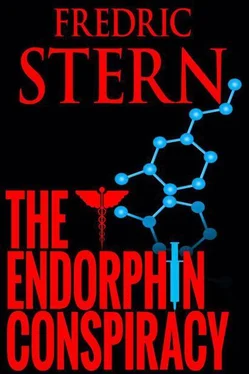Geoff thanked Evers politely, brushed quickly past her desk, and knocked softly on the dark-paneled door.
“Come in,” replied the familiar baritone voice, muffled by the door. Geoff entered the inner sanctum, treading lightly as he always did with “the Colonel” in the intimidating surroundings of what the residents referred to as “headquarters.”
Richard Pederson was an imposing man. In many ways, he reminded Geoff of his commanding officer in the navy. Tall and lanky, with thinning, reddish-brown hair strategically combed to camouflage his baldness, his large hands and long, thin fingers seemed made for gripping a basketball as much as a surgical instrument. Indeed, he had played college ball for a while, a fact he freely share with the residents when in a particularly chummy spirit, which occurred twice a year—at the departmental Christmas party and at the annual reception he hosted at his home for the new residents.
Pederson had a tremendous need to exercise control over himself and those around him. This was exemplified by his annoying habit of strategically dropping his voice so that he could barely be heard, forcing the listener to strain to hear exactly what he was saying.
Exceedingly formal, Pederson vented his perpetually bridled carnal desires by telling lewd jokes, though never in the presence of female residents. His equally stilted wife, Corinne, the only daughter of a Presbyterian Minister, played the role of officer’s wife as closely to the script as humanly possible, the only apparent paradox being her spirited interest in her husband’s base jokes. Two seeming Puritans in public, every resident that passed through over the years was convinced it was all leather, whips, and chains behind closed doors. Even if it wasn’t true, the notion made Pederson seem at least somewhat human.
At sixty-two, Pederson had been Chairman of the Department of Neurosurgery for eighteen years, having been named to the position at forty, then the youngest department chairman in the country in his field of specialty. A brilliant clinician, superb surgeon, and equally keen politician, he had honed his skills in the Army Medical Corps during the first Gulf War, attaining the rank of Colonel after only four years. He had come to NYTC—then the old City Hospital—from the Massachusetts General Hospital and immediately established himself as a force to be reckoned with at the medical center as well as on a national level.
Surgically, he had pioneered a new laser treatment for epilepsy, which complemented the powerful information provided by Balassi’s PET scanner. The two had begun collaboration on the epilepsy project while Balassi was at the NIH. They had revolutionized the surgical treatment of seizures.
Pederson’s political acumen was neatly documented on office walls replete with meticulously oak-framed certificates, diplomas and all the right photos with civilian and military VIP’s shaking hands and smiling.
Seated in a high-back, swivel chair, reading glasses resting half-way down his long nose, Pederson’s profile was silhouetted by hazy sunlight diffusing through the large window that overlooked the GW Bridge. He appeared thoroughly absorbed studying a PET scan on the light box above his side table when Geoff entered the room. Geoff approached the desk and stood for what seemed like minutes.
“Welcome, Geoff,” Pederson said. He stood reluctantly and turned his attention away from the scan. “Didn’t mean to ignore you there—just a fascinating and most significant scan.” Pederson extended his large hand. “I’m sure you’ve been dreaming about this day for seven years. I know I did when I was a resident. Come, sit down.” He gestured toward the wingback chair opposite the desk.
Geoff sat down, his posture held erect by the vertical incline of the chair’s back. The room smelled of polished leather. Geoff was reminded of the time in high school he’d been called to the principal’s office to receive a commendation but had assumed he was being summoned to answer for an offense he couldn’t remember.
“Thank you, Dr. Pederson, but I must admit I’m a bit anxious.” At that moment, the strange e-mail message played across Geoff’s mind. Obviously not to be so readily dismissed as he had thought.
“Well, I can certainly appreciate that, Geoff,” replied Pederson quite matter-of-factly. “But you have nothing to be anxious about. Your selection as chief resident was unanimous among department members. Your record at Harvard and during your residency here is beyond reproach, your surgical skills far beyond your years. Equally as important for this position—and I think you know this—you have a leadership quality, an innate gift few men have, fewer still in medicine. Whether or not you realize it, you are a future leader should you decide to stay in academic medicine. I hope you will.”
Pederson swiveled in his chair and gazed at the slightly yellowed, black and white photo of his own residency class, his full lips and hooded upper lids forming an ever-so-slight, nostalgic smile. “You remind me of myself at your age, Geoff. Top of my class, called upon by the great Dr. Bedrossian, then Chairman at the MGH, to do the same honor as yourself. I was terrified! It wasn’t until I was about halfway through my chief residency that I realized my worth. You will feel the same shift, though I don’t think it will take you as long.”
Geoff was taken aback by the flood of compliments. Pederson was a man who rarely let you know where you stood. When he did offer praise, it was usually gilded with sarcasm. Geoff was glimpsing an entirely different side of “the Colonel,” and he felt privileged.
Had Pederson forgiven the events of the last year so quickly, so easily? Geoff had to know, clear the air at the start. “I appreciate your confidence, sir, but my performance at the end of my last clinical year was far from stellar.”
“Geoffrey, Geoffrey,” Pederson said, his towering frame leaning forward over the desk. “I haven’t forgotten. We all go through major crises in our lives, emotional traumas so great we feel as if we can’t go on. The death of a loved one is the most traumatic of human experiences. Believe me, I know.”
Another glimpse beneath the armor. Pederson was human after all.
“The bottom line is, it’s over. Your life is back on track. Balassi tells me you did a superb job in the lab, and now you’re back in the saddle. Let’s forget the past and look to the future, which seems bright indeed.”
Geoff’s anxiety melted away, leaving him with a peace he had not felt in a long time. He began to feel excited about work, something he had not experienced since his early days as a resident. “Thank you, Dr. Pederson.”
Pederson stood up and removed a large three-ring binder from the top shelf of his mahogany bookcase. On the side was printed, “Manual of the Chief Resident of the Department of Neurosurgery,” and on the front the seal of the NYTC, a melding of both the new and the old: the ancient caduceus—serpents intertwined around a staff—a picture of the new medical center, and an inscription from the old one: “For of the Most High Cometh Healing.”
He handed the notebook to Geoff, the baton passed from mentor to apprentice, the same ritual repeated each of the last eighteen years. “Everything you need to know as chief is in this manual. Read it completely. I know you will do a fine job. Any questions?”
Geoff’s mind was clear, his attention focused. He felt relieved of the burden of the past, encouraged by his prospects. He felt he might as well start clean right now, get it all off his chest. “Not a question, but something you need to know from me before you hear it from someone else.”
“Oh?” said Pederson, his right brow elevated, his curiosity aroused. Obviously, he hadn’t heard yet.
Читать дальше












